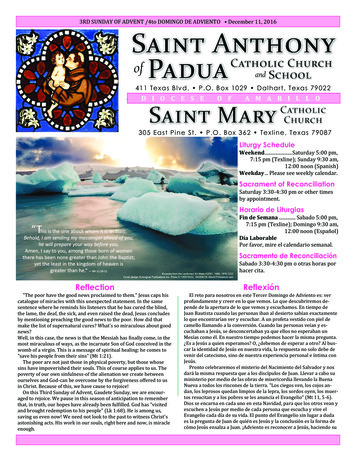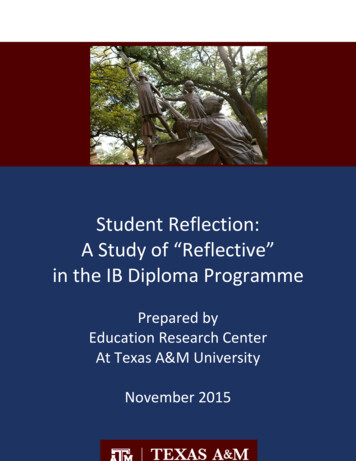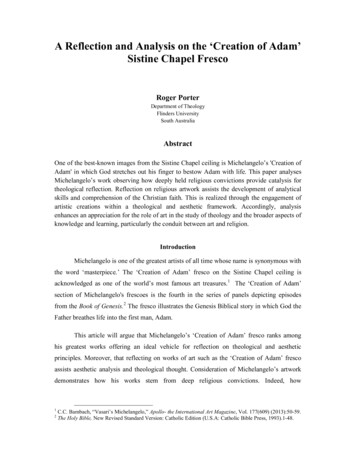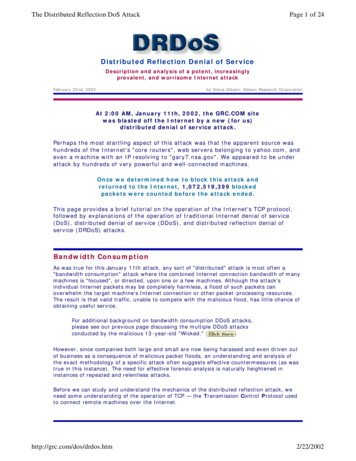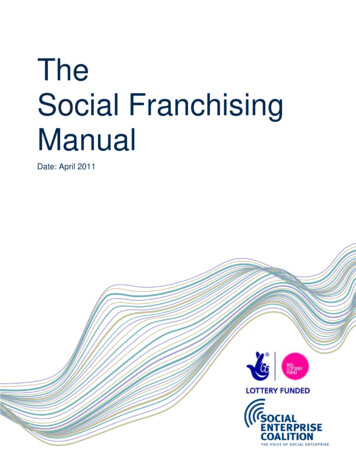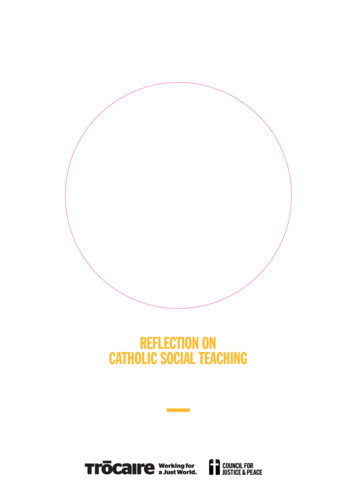
Transcription
REFLECTION ONCATHOLIC SOCIAL TEACHING1
2
“An authentic faith – which is never comfortable orcompletely personal – always involves a deep desireto change the world, to transmit values, to leavethe earth somehow better than we found it.”Pope Francis, Evangelii gaudium, 1833
Introduction to CatholicSocial Doctrine“An authentic faith – which is never comfortable or completely personal– always involves a deep desire to change the world, to transmit values, to leavethe earth somehow better than we found it.”Pope Francis, Evangelii gaudium, 183The call to justice and peace has always beenan essential part of the life of the Christian.Our sacred texts offer a constant reminder ofthe centrality of this call. In the Old Testamentthe prophet Micah tells us: “this is whatYahweh asks of you: only this, to act justly, tolove tenderly, and to walk humbly with yourGod” (Micah 6:8).city which is to come, we are entitled to shirkour earthly responsibilities; this is to forgetthat by our faith we are bound all the moreto fulfil these responsibilities according to thevocation of each one” (Gaudium et spes, 43).For Christians, of course, the New Testamentcontains the perfect example of God’s justiceand mercy, Jesus Christ. The life and ministryof Jesus was one of inclusion, compassion andThe writings of all the prophets provideforgiveness. Christ’s actions were counterreminders of the sort of life Yahweh wishescultural; through his words and deeds hefrom the people of the Covenant: a life ofjustice, mercy, compassion and loving-kindness. challenged prevailing attitudes and structuresthat served to exclude and oppress sections ofThe prophets denounce the hypocrisy of theirsociety. The parable about the Good Samaritansociety. To be a hypocrite is to wear a “falseillustrates that point well. Jesus is critical of aface”, to pretend to be someone or somethingsituation where religious ritual and religiousthat you are not. What the prophets lamentedideology become more important than helpingwas a society that neglected the mostvulnerable within it. For Amos, worship of God someone who is in pain. And in Matthew 22:3440 we note the double commandment to loveis meaningless unless it is also put into dailyboth God and neighbour. In other words, love ofaction. “I hate, I despise your feasts, I take noGod cannot be divorced from the working outdelight in your solemn assemblies but letjustice roll down like waters and righteousness of justice and peace in this world.like an ever-flowing stream” (Am. 5:21, 24).The earliest Christian community tookinspiration from the life and example ofThese texts show a deep concern for theChrist, and from its infancy the Christian faithmarginalised – the widow, the orphan, theembraced the world. The early Christians wentpoor and the stranger in a strange land. Theout into the world, conscious of its dangers andstrength of the Covenant relationship withits shortcomings, but with a deep convictionYahweh is witnessed through commitment tothat they could change it for the better. Theirsthe suffering of others, and not just throughwas not a private faith, one that remainedvisits to the Temple. Thousands of yearssheltered from the world. Rather, the Christianlater we hear those words of the prophetsfaith was one that was proactive, inclusive andecho through the Council Fathers when theydriven by the joy of the Gospel message. Asproclaimed that, “it is a mistake to think that,Pope Francis explains, “Reading the Scripturesbecause we have no lasting city, but seek the4
also makes it clear that the Gospel is not merelyabout our personal relationship with God TheGospel is about the Kingdom of God; it is aboutloving God who reigns in our world BothChristian preaching and life, then, are meant tohave an impact on society” (Evangelii gaudium,180).For centuries later, this social consciousnessacted as a motivation for Christians in timesof crisis. The front-line response to famines,to the sufferings of war, and to plagues,invariably came from Christian groups. Monks,priests and nuns commonly became theproviders of education and healthcare. In time,organisations such the Society of St Vincentde Paul emerged, taking on a more formal andorganised structure, but always guided by thatsame Christian calling to social justice. PádraigCorkery captures this dynamic nature of ourfaith well: “The Gospel challenges us not to beindifferent or hostile to the world we inhabitbut to take it seriously and to take responsibilityfor it. As women and men of faith, who strive toshape our lives around the Gospel, our presencein the world is meant to be a dynamic, engagingpresence that contributes to the transformationof the world.” 1What we now call the Social Teaching of theChurch is a more recent development. Thisrefers to the body of official teaching on social,political and economic affairs that has beencompiled incrementally over more than acentury. Pope Leo XIII’s great social encyclicalRerum novarum (1891) is generally taken asits starting point. That document was thefirst attempt by the Church’s Magisterium toaddress in an official way the social concerns ofthe time. From then onward a set of teachinghas emerged that deals with a large number ofsocial justice issues in all parts of the world, andis found primarily in what are called the socialencyclicals.Such is the significance of Rerum novarumthat many of the subsequent social encyclicalswere issued to mark its anniversary. Butthe Church’s social teaching also includesa Pastoral Constitution (Gaudium et spes),Declarations (such as the Declaration onReligious Freedom of Vatican II), ApostolicExhortations (Pope Paul VI’s Octogesimaadveniens for example, or Pope Francis’Evangelii gaudium), documents issued bySynods (Justice in the World, 1971), as wellas statements of Bishops’ Conferences fromaround the world (for example the IrishCatholic Bishops’ Conference PastoralReflection entitled The Cry of the Earth, 2014).A number of key events and developmentshelped shape the social teaching of theChurch. The earliest documents tended to beEuro-centric in focus, dealing with issues ofconcern primarily to the European Church: therights of workers in industrialised Europeancities for example, the crisis surroundingthe Great Depression of the late 1920s andearly 1930s, the rise of totalitarian regimes,and so forth. However, the 1960s saw achange as the teaching became more globalin outlook. International social, political andeconomic developments such as the Cold War,decolonisation, civil rights movements, andgrowth in international trade, meant that thesocial justice agenda now became global inreach. These have been joined more recentlyby questions of environmental justice andrelated issues. Thus, our understanding ofsocial relationships and, by implication, of oursocial responsibilities has taken on a muchbroader dimension than was earlier the case.The social teaching of the Church covers ahuge variety of issues; one might say thatanything that affects our social relationshipsis of concern to it. Popes have responded to the“signs of their times” by publishing documentsthat challenge the social consciousness of “allpeople of good will”, a phrase that with Materet magistra marked the start of the practiceof addressing this kind of document to anaudience beyond the Church’s boundaries.Poverty, the rights of workers, homelessness,sexual exploitation and trafficking, war,migration, displacement of peoples, sustainabledevelopment, trade, ecology, economics,business ethics, banking crises, HIV, access tohealthcare, food security, rights of prisoners,rights of ethnic minorities — all of these arenow seen to be proper subjects of individualand collective moral concern.–1 Pádraig Corkery, Companion to the Compendium of theSocial Doctrine of the Church, (Dublin: Veritas, 2007), p 18.5
The underlying insight is that everyone has theright and responsibility to live in our worldconstructively, not destructively, and to ensurethat we leave it in a better state than when weentered it.the heart of the Gospel message, and thereforecentral to the Christian mission. Evangelisationis achieved not only through proclaiming thejoy of the Gospel, but also through action forthe betterment of our world.At the core of Catholic Social Teaching are anumber of key concepts and principles. Chiefamong these are justice, human dignity, thecommon good, the principles of participation,solidarity, and subsidiarity, the universaldestination of the world’s goods, and the optionfor the poor. We shall look at these in detailin the next section, but meanwhile we mustanswer two questions that are often asked.The second of our questions is related tothe first: how much weight does the socialteaching of the Church carry? Is it as importantas other moral teachings of the CatholicChurch? The Magisterium leaves us in nodoubt. The Compendium states: “Insofaras it is part of the Church’s moral teaching,the Church’s social doctrine has the samedignity and authority as her moral teaching.It is authentic magisterium, which obligatesthe faithful to adhere to it.”2 It requires littlethought to see a direct moral significancein the themes of Catholic Social Teaching towhich we now turn.The first can be put as follows: is social concernan optional extra for the Christian, somethingthat we are free to disregard as part of what isdemanded of a follower of Jesus? The answermust be an unequivocal no. We have alreadyglanced at the basis for this answer in keybiblical texts, to which we can now add thenumerous Church documents which remind usthat a commitment to justice and peace is at62 Pontifical Council for Justice and Peace, Compendium ofthe Social Doctrine of the Church, (New York: ContinuumInternational Publishing Group, 2005), para. 80.
Justice“Come you whom my Father has blessed, take for your heritage the kingdom preparedfor you since the foundation of the world. For I was hungry and you gave me food; I wasthirsty and you gave me drink; I was a stranger and you made me welcome; naked andyou clothed me, sick and you visited me. In prison and you came to see me.”Matthew 25: 34-6“Why do you call me ‘Lord’ and not do as I say?” (Luke 6:46)The biblical understanding of justice is markedly relational. Both the Old and the NewTestament support a vision of justice thatplaces the person and human relationships atits centre. This helps to act as a counter-balanceto narrow, or individualistic, notions of justiceand its demands.In the Old Testament we see that the “justperson” is one who is in right relationship withhis workers, his neighbours, the piece of earththat he inhabits (Job for example). By contrast,the unjust person is one who neglects thosearound him. The prophets criticised those whofailed to take care of the vulnerable in society– the widow, the orphan, the poor, the alien ina strange land. The God of the Old Testament,we are reminded, is one who stands with thosewho suffer injustice. Indeed, the prophetsrealised that faith in Yahweh is meaningless ifit is not accompanied by a living out of God’sjustice and mercy in the here and now.In the New Testament, the life and ministryof Christ offers a complete picture of the justicethat in the Hebrew Bible is ascribed to Yahwehand expected of Yahweh’s people. The ministryof Jesus is what we would call an inclusiveministry. As we watch it we witness a Godwhose love goes to the margins of society; aGod whose actions are counter-cultural; a Godwho cares more for people than for what ismerely a contingent rule.Discussion QuestionsHow might the biblical understanding of justice, and especially the witness of Christ, shapethe way in which we govern and organise ourselves in our parish or in our diocese?How might the inclusiveness with which Jesus looked on those to whom he ministered challengeus at local Church level? Are we hospitable to the stranger, to those who are on the margins?In contemporary Ireland, whom do we identify as the stranger?7
Human Dignity“Do not try to combine faith in Jesus Christ, our glorified Lord,with the making of distinction between classes of people.”James 2:1Christian anthropology offers an understanding of the person that has certain readilyidentifiable characteristics. We recognise theperson as relational and social. Christians holdthe belief that human beings are made in God’simage and likeness (imago Dei), and thereforethe human person has an innate dignitythat must be honoured. This way of lookingat the person is enhanced by the Christianunderstanding of God as Trinity.For the Father, the Son and the Holy Spiritare obviously interrelated, and theirinterrelationships – the way each Person isrelated to the Others – provide an exemplarfor right human relationships too. If we aremade in the image of this trinitarian God,it follows that we are meant to relate as theThree Persons do. And among the qualitiesof the interrelationships of Father, Son andHoly Spirit are mutuality, respect, equality(none is subordinate to any other Person) anduniqueness. Even within the close relationsof the Three, as ancient Christian writersenvisaged the life of God, each divine Personhas the space and opportunity to ensure thathis uniqueness emerges.Acknowledging in this way the dignity ofevery human being, irrespective of race, gender,skin colour, religion, ethnicity, means that ourmodern talk of human rights fits beautifullyinto Christian thinking. Correspondingly, thedevelopment of human rights theory, languageand legislation helps to reinforce Christianfaith in the dignity of each human person.Related concepts such as the principle ofparticipation, the common good, solidarityand justice also complement this; our dignityis connected to our social and inter-personalnature. Thus, one finds in the social teachingof the Church a constant attempt to balancethe individual (and his/her rights) withthe social (the corresponding duties thataccompany these rights). Therefore, while thedign
Evangelii gaudium), documents issued by Synods (Justice in the World, 1971), as well as statements of Bishops’ Conferences from around the world (for example the Irish Catholic Bishops’ Conference Pastoral Reflection entitled The Cry of the Earth, 2014). A number of key events and developments helped shape the social teaching of the Church. The earliest documents tended to be Euro-centric .
